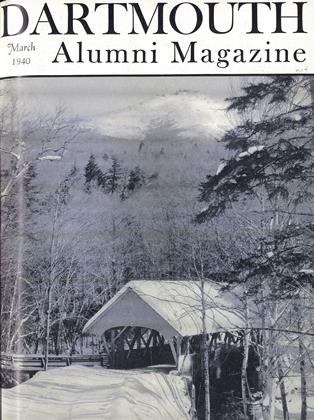WHEN HE BEGAN to think about reasons for supporting the College Ben Ames Williams questioned in his own mind whether the College is do- ing its full duty by the alumni. In his stimulating discussion of "An Obligation to Alumni" in this issue Mr. Williams asks: "Is the College's potential service to Dartmouth men ended when they graduate? Is there not some way in which the College as a college can continue to enrich their lives?"
After four undergraduate years, he says, the experience is over for most men. In the next 50 years they are not closely in touch with the institution whose spirit is implanted in their hearts in youth, and whose challenge then began to broaden their minds. Meanwhile the College asks for their support, and directly depends upon this to such an extent that it could not exist without the help, in a variety of ways, of the alumni.
Much stress is placed upon establish- ing and maintaining lines of communica- tion between the College and the alumni. That the lines binding far-flung Dart- mouth together must operate both ways, that the College is obligated to the alumni, as well as the vice versa point which we hear more about, is thoughtfully expressed by Mr. Williams. What has been done? What more should and can be done?
THE SEED OF THE alumni movement at Dartmouth—the recognition of the importance of alumni in College affairswas planted by Dr. Tucker at the beginning of his fruitful administration in 1893. It flourished under his inspiring guidance. The movement reached maturity in more recent years when President Hopkins has without stint given his strength of thought, effort, and leadership to improving alumni relationships. In this task he has relied most upon the alumni themselves. Not scores, but hundreds upon hundreds of men, in the midst of business and professional careers, have taken the time and trouble to give, in turn, their thought, effort, and leadership to Dartmouth interests.
For example, the Alumni Fund is not run by the College. It is not planned or operated in Hanover. The Fund, with its amazing success every year, is directed by a committee of the Alumni Council and is actually operated by several hundred class agents. This MAGAZINE would be a thin and lifeless shadow of itself were it not for the monthly columns from secretaries of classes and alumni clubs, and the news and comment otherwise provided by alumni. In both cases Hanover offers management, and administrative and routine help. But the alumni movement would die without the vitality, this genuineness, the tangible and intangible contributions of those who are determined that the College shall endure and that it shall prosper; who believe that its work is great and must continue.
HAROLD NICOLSON in his biography of Dwight Morrow reports that Mr. Morrow was so devoted to Amherst College that he placed its affairs, in which he was active, among the most important items on his daily calendar. The late Tom Corcoran stated his ambition in life to be to strengthen Phillips Andover Academy. In this he was eminently successful. So it is with other institutions. Dartmouth has many men at the present time who are carrying on a noted tradition—the distinctive strength of its alumni relationships.
 View Full Issue
View Full Issue
More From This Issue
-
 Article
ArticleEducation At Its Best
March 1940 By ARTHUR DEWING '25 -
 Sports
SportsBig Green Teams
March 1940 By Whitey Fuller '37 -
 Article
ArticleAn Obligation to Alumni
March 1940 By BEN AMES WILLIAMS '10 -
 Article
ArticleHanover Browsing
March 1940 By HERBERT F. WEST '22 -
 Class Notes
Class Notes1930*
March 1940 By ALBERT I. DICKERSON -
 Article
ArticleThe College in the Sixties
March 1940 By DR. WILLIAM LELAND HOLT







